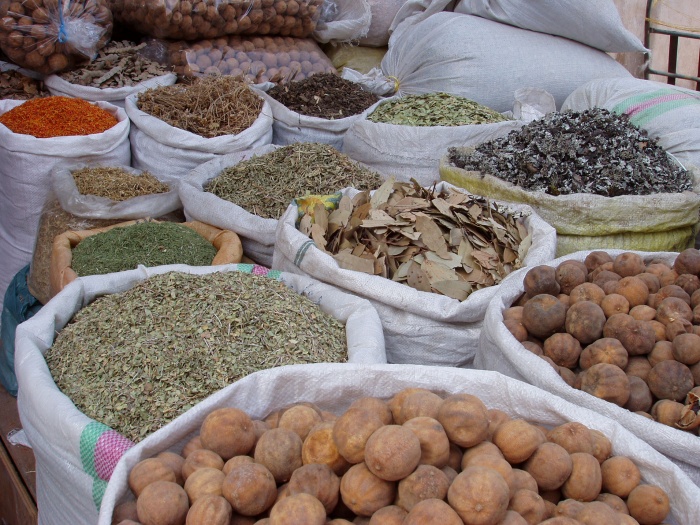By: Rabbi Tsvi Heber, Director of Community Kosher Operations
One might assume that naturally unadulterated produce such as fresh herbs would inherently pose no kashrus concern. Unfortunately, this is not the case. Fresh herbs are prone to insect infestation. Miniscule insects such as aphids, thrips and spider mites can be located on the surface of the leaves or stem and are often lodged in the crevices between the leaves and the branches. Although herbs are naturally kosher, insects are certainly not! A halachic bedika (inspection) is mandatory to ensure that herbs are free from infestation.
The Bedika
To date, there is no practical method of confirming, through visual inspection, that herbs have been cleaned effectively. As opposed to lettuce whose flat surface allows for visual confirmation, the physical structure of fresh herbs combined with the generally miniscule size of the insects, make a simple bedika of herbs impossible. Rabbanim and kashrus professionals have struggled to devise methods that would qualify as an equivalent to the visual inspection.
The approach that is used to remedy this problem is to establish a chezkas kashrus (halachic assumption of kosher status) of the herbs through visual inspection the water that is used to soak them. Although an inspection of the soak water does not guarantee that insects do not remain on the herbs, it does provide a level of comfort to assume that the herbs contain minimal to no infestation. Based on this assumption, we can further clean the herbs to rid them of any potential insects.
Procedure
The following procedure is recommended by COR. Care must be taken to perform this procedure meticulously and with patience. Before using this procedure, one must be certain that he is familiar with the nature of the insects that infest herbs so that he knows what he is looking for when performing the bedika.
Please note that curly parsley and dill are highly infested and are very difficult to check properly. They are not recommended for use. Curly parsley can be substituted with flat parsley. A number of options for fresh dill are outlined below in the section entitled (“Alternatives”)
For fresh and specialty herbs – chives, cilantro, coriander, flat parsley, mint, oregano, thyme, rosemary, sage, tarragon:
1. Fill a container with cold water and add several drops of a vegetable wash or other similar soapy solution
2. Submerge one bunch of herbs in water and agitate thoroughly
3. Remove herbs from water (save the water) and place them in a separate container
4. Allow any foam to clear and pour all of the water through a fine screen or tight white cloth. A coffee filter or cloth diaper (not terry) may be used as a filter.
5. In a well-lit area, carefully examine the screen or cloth for the presence of miniature insects. A light-box is highly recommended.
§ If no insect is found, proceed to step 6.
§ If an insect is found, herbs are not recommended for use
6. Herbs should be held in a downward position under a heavy stream of water. Spread them out and pull them apart to allow the water to pass through all of the herbs. Care should be taken to separate any clusters and to ensure that the water is passing through all areas of the herbs.
For basil:
1. Fill a container with cold water and add several drops of a vegetable wash or other similar soapy solution
2. Submerge basil in water and agitate thoroughly
3. Allow basil to soak for 3-5 minutes
4. Remove basil from water and rinse each leaf under a strong stream of water hitting both sides of the leaf
5. In a well-lit area, a large sampling (at least three handfuls) must be checked to verify the effectiveness of the wash. Both sides of the leaf should be checked.
Please note the following:
a) A light-box is highly recommended for checking
b) If possible, it is recommended to check all leaves individually
c) A salad spinner is also recommended. The advantage is that the basil will stay fresh and moist for a longer period of time and it will help free the leaves from insects.
Leaf Miners
A leaf miner is a type of worm occasionally found in basil. It embeds itself inside the leaf and therefore cannot be washed off, but leaves visible zigzag trails, sometimes spotted with black dots, which are noticeable on the surface of the leaf. A sample of basil leaves should be inspected on both sides for such trails. If trails are not discovered, no further checking is necessary. If trails are discovered, cut away the portion of the leaf containing the trail and continue to check all leaves from the bunch.
The frequency of leaf miner infestation has yet to be determined and, as such, it is not clear that inspection is mandatory. Nonetheless, a quick inspection for leaf miners is highly recommended.
Alternatives
If the aforementioned procedures seem cumbersome, alternative choices may be an easier route in specific circumstances:
Greenhouse-Grown – Packaged greenhouse-grown herbs that are sold in retail markets must bear reliable kosher certification indicating its status vis-a-vis checking for insects. Kosher greenhouse growers work closely with kosher certifiers and field experts to ensure that produce grown in their specialized greenhouses do not contain infestation.
Dehydrated Herbs – Dried herbs that bear a reliable kosher certification may be used without any inspection.
Garnet Bag (“Bodek bag”) – A garnet bag or equivalent is a tightly meshed bag or cloth that allows the flavour of the herbs to pass through the mesh into a pot of food while holding the herbs (and any potential insect) inside. The herbs should be washed thoroughly with water, placed inside the garnet bag or cloth and tied closed. No inspection is necessary. It is important to note that standard cheesecloth is not adequate for this procedure, as the holes will allow an insect to pass through into the food.
Puree – One may use the following procedure if the recipe requires the herbs to be pureed — for example, pesto. The herbs should be washed as per the aforementioned procedure, leaving out the step that involves checking. After the herbs are thoroughly washed, they can be placed in a blender and blended (with other ingredients, if desired) until the consistency is an authentic puree. The final product should not look like chopped herbs but should rather have the consistency of a smooth paste.
Additional Laws of Eretz Yisroel
It is common to find a variety of fresh herbs that originate in Israel. Such herbs are, during the six-year cycle, subject to the laws of Terumos and Maaseros. During the Shemittah year, Israeli herbs are subject to the laws of Shemittah. When purchasing a package of greenhouse herbs from Israel, one must ensure that the package bears a reliable kosher certification whose treatment of these laws meets the halachic standard. For more details on these laws and how to deal with Israeli produce in general, please contact our office at (416) 635-9550 ext. 365.

